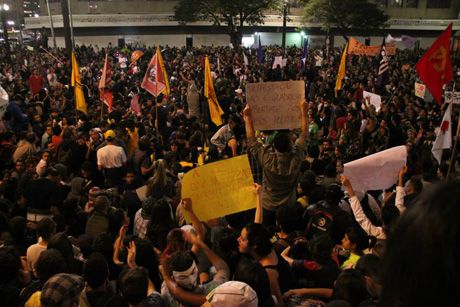Shared
You are here
Brazil: this is about public transport fares but it’s about much more too

June 19, 2013
Massive protests have exploded in numerous Brazilian cities in the last week over public transit fare hikes, preparations for the World Cup, political corruption and general frustration with the poor quality of public services.
On June 17, there were huge demonstrations in 12 capital cities, including more than 100,000 people each in São Paulo and Rio de Janeiro. In the capital city, Brasília, thousands of protestors invaded the national Congress buildings. There were sizable contingents of trade unionists (teachers, metal and chemical workers) and social movement activists with their own banners on all the demonstrations.
Despite massive police repression, the movement continues to grow, forcing municipal governments to the negotiating table over transit fare hikes and—in eleven cities, including nine state capitals—promises by governments to actually lower bus fares. In São Paulo, the mayor has conceded that fare reductions are now on the table.
Majority support
Polls have shown majority support for the protests among the population and there have been demonstrations in solidarity from Brazilians abroad and their supporters in Berlin, New York, San Diego, Montreal, Washington and Dublin, with dozens of other cities in North America, Europe and Asia planning similar demonstrations in the next week. Messages of solidarity from protestors in Taksim Square in Turkey have been sent and were reciprocated in the Brazilian protest on Monday with dozens of Turkish flags and placards with solidarity messages.
The Free Fare movement in São Paulo—especially its high school and university students, but also trade unionists and activists from a broad section of social movements—organized the first protest soon after bus and subway fares were increased by 6 per cent on June 2.
The municipal government, headed by Fernando Haddad of the Workers’ Party (PT), claims that the increases are below inflation, but many analysts have shown that over the last twenty years the cost of public transit has increased well above inflation, making São Paulo the most expensive city for public transit in Latin America. Dozens of other Brazilian cities launched or re-launched similar Free Fare movements in the wake of the São Paulo protests. These movements dovetailed with mobilizations against the World Cup and other local issues.
After massive police repression of the demonstration in São Paulo on Thursday June 13, the movement spread even further across Brazil.
Growing dissatisfaction
The protests come at a time of growing dissatisfaction with the neoliberal politics of the two main parties in Brazil, the Brazilian Social Democratic Party and the PT. Activists have shown that the politics of the two supposedly rival parties are exactly the same: making Brazil safe for business while neglecting the massive social disparities and inequality in the country. Politicians from both parties have condemned the Free Fare movement protests, as has the PT federal government. But many grassroots activists from the PT have participated in the protests along with militants from PSOL.
At the same time as the protests against fare increases arose, activists across the country protested the preparations for next year’s World Cup in Brazil. Billions have been spent upgrading stadiums and thousands have been displaced from their homes in an effort which has boosted the profits of large companies and produced few benefits for the population.
Turkish parallels
As in Turkey, Brazil has recently experienced economic prosperity. Just like Turkey, however, economic inequality is staggering. The rich have benefitted proportionately more from the Brazilian “economic miracle” but expectations have also increased among the population. Healthcare, education, public transport and other public services are still in shambles and people are beginning to mobilize in large numbers. And also as in Turkey, a relatively local and small-scale movement sparked off large nation-wide protests.
More demonstrations are planned in the next few days and militants are debating the next steps, including arguments for the necessity of strike actions in support of the Free Fare movement and against police brutality.
Sean Purdy is a member of the Party of Socialism and Freedom (PSOL) and activist in the Free Fare Movement, São Paulo. This article is republished from Red Pepper
Section:
Topics:










